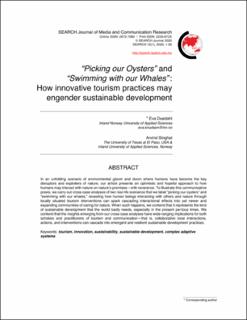“Picking our Oysters” and “Swimming with our Whales”: How innovative tourism practices may engender sustainable development
Peer reviewed, Journal article
Published version
Permanent lenke
https://hdl.handle.net/11250/2761733Utgivelsesdato
2020Metadata
Vis full innførselSamlinger
Originalversjon
SEARCH Journal of Media and Communication Research. 2020, 12 (1), 1-26Sammendrag
n an unfolding scenario of environmental gloom and doom where humans have become the key disruptors and exploiters of nature, our article presents an optimistic and hopeful approach to how humans may interact with nature on nature’s premises—with reverence. To illustrate this communicative praxis, we carry out cross-case analyses of two real-life scenarios that we label “picking our oysters” and “swimming with our whales,” revealing how human beings interacting with others and nature through locally situated tourism interventions can spark cascading interactional effects into yet newer and expanding communities of caring for nature. When such happens, we contend that it represents the kind of sustainable development that the world badly needs, especially in the present perilous times. We contend that the insights emerging from our cross-case analyses have wide-ranging implications for both scholars and practitioners of tourism and communication—that is, collaborative local interactions, actions, and interventions can cascade into emergent and resilient sustainable development practices.

